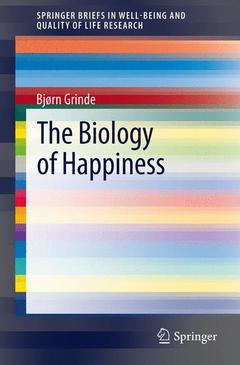The Biology of Happiness, 2012 SpringerBriefs in Well-Being and Quality of Life Research Series
Auteur : Grinde Bjørn

The brief presents a model for happiness based on current knowledge in evolutionary biology and neurobiology. Briefly, the primary purpose of nervous systems is to direct an animal toward behaviour relevant for survival and procreation. In primitive animals actions are based on reflexes, while in humans the modules directing behaviour engage positive and negative affect (good and bad feelings), and they are swayed by cognitive processes. The reason why evolution opted for this strategy was the improved flexibility in response ? i.e., we learn from previous experiences. The human capacity for happiness is an accidental consequence.
An array of brain modules has evolved to care for various pursuits, but recent studies suggest that they converge on shared neural circuits designed to generate positive and negative mood. Happiness can be construed as the net output of the relevant modules. The briefs suggests a strategy for how to avoid having negative feelings (such as anxiety, depression and chronic pain) dominate the mind, and how to exercise positive feelings. In short, the book offers both a deeper understanding of what happiness is about, and a framework for improving well-being.
An array of brain modules has evolved to care for various pursuits, but recent studies suggest that they converge on shared neural circuits designed to generate positive and negative mood. Happiness can be construed as the net output of the relevant modules. The book suggests a strategy for how to avoid having negative feelings (such as anxiety, depression and chronic pain) dominate the mind, and how to exercise positive feelings. In short, the book offers both a deeper understanding of what happiness is about, and a framework for improving well-being.
Preface.- Chapter 1. Introduction: From Philosophy to science.- Chapter 2. Evolution of Nervous Systems.- Chapter 3. The Human Brain.- Chapter 4. Mental Health.- Chapter 5. How to improve Happiness.- Chapter 6. The Politics of Happiness.- Chapter 7. Concluding Remarks.- References.-
Bjørn Grinde received his education in the natural sciences, psychology, and anthropology from the University of Oslo, ending with a Dr.scient and Dr.philos in biology. He is presently employed as Chief Scientist at the Division of Mental Health, Norwegian Institute of Public Health. He has previously served as scientist and professor at top universities in Norway, United States and Japan. A lasting focus has been to understand the process of evolution, particularly how it has formed the human brain and our capacity to enjoy life. He has written several books, including Darwinian Happiness – a book that suggests how the biological perspective can be used for guidance in living.
Provides a unique angle on what positive feeling, or happiness, is about
Helps the individual improve his/her life
Suggests preventive options to reduce mental agony and suffering in society
Includes supplementary material: sn.pub/extras
Date de parution : 04-2012
Ouvrage de 109 p.
15.5x23.5 cm
Disponible chez l'éditeur (délai d'approvisionnement : 15 jours).
Prix indicatif 63,29 €
Ajouter au panier


